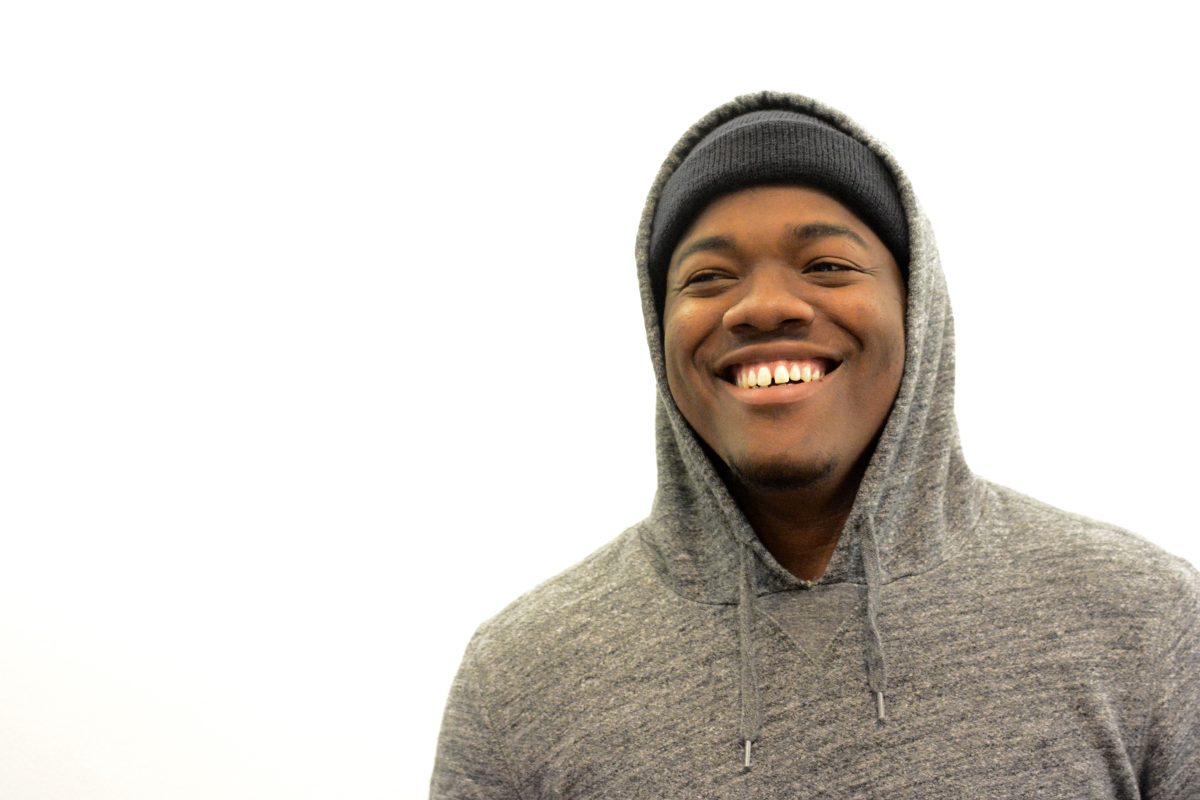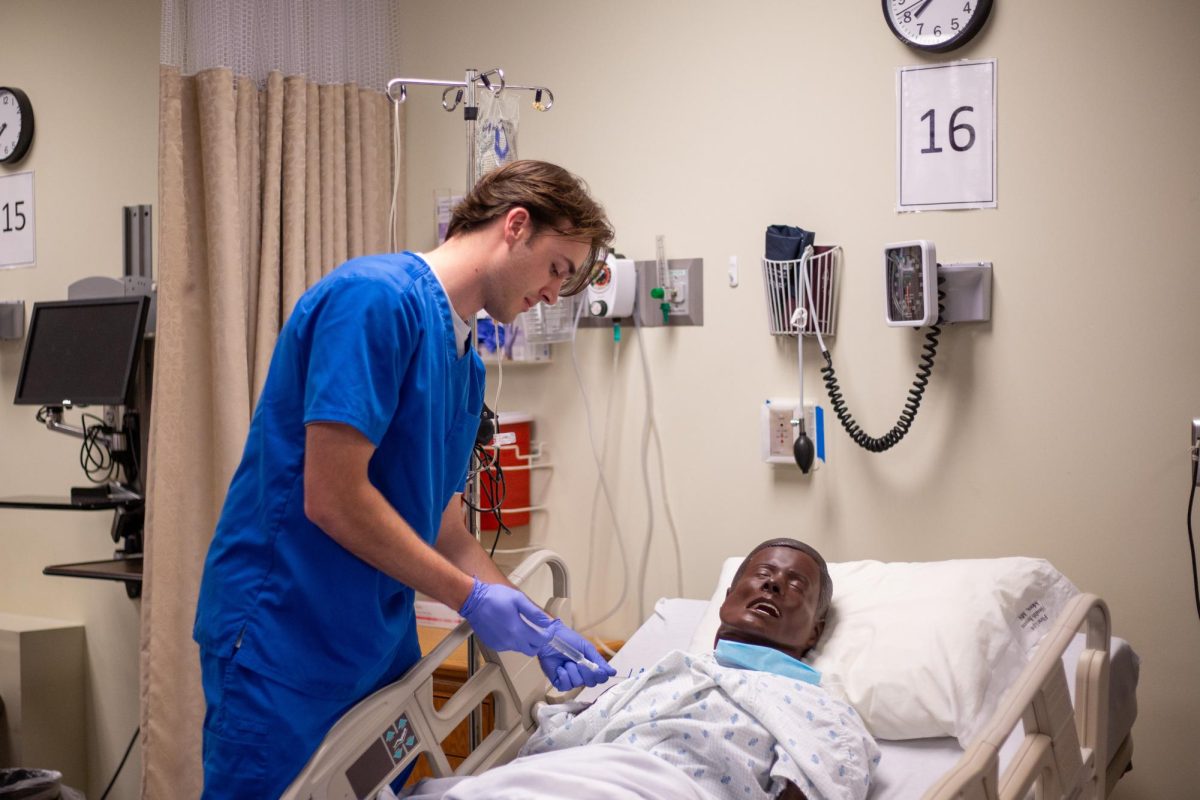by Trevor Erickson
If you see him, he’s probably smiling. A Nelson RA, Tim Hunt moves through Monson Dining Center, broad shoulders rocking rhythmically, his light-wash denims tucked into black Converse shoes.
“I’ve always had kinda had an ‘I’m here’ walk,” Hunt said, pressing through the turnstiles.
A senior relational communications major, Hunt has never had a problem projecting purpose and confidence. He’s performed spoken word both at Bethel and abroad, most recently trying his hand at stand-up comedy in Nelson’s talent show.
“He is excellent at communication, and not afraid to start relationships and conversations with new people,” recent grad Patrick Bentz said.
Tim is hunched over as he talks, his hand firmly under his chin as he untangles unfamiliar thoughts. For a moment, it’s as if the confident persona that has defined him throughout the last four years has been suspended. For a moment, the signature high-pitched cackling laughter is absent. His is a story of triumph, perhaps, but it’s also a story of uncertainty, transition, chaos and largely hidden suffering.
Timothy Jared Hunt was born in Chicago in the winter of 1994. He’s never met his dad, and he’s no longer sure he wants to. After the murder of Tim’s youngest uncle, the Hunt family—comprised of mom Sheila, sister Latisha and Tim—quickly took refuge in the rural Mississippi town of Hillsboro, where both sides of his mom’s family lived, in search of a different life.
Hunt grew up on a long gravel road, the kind where most homes are thousands of feet between each other, plotted amid mazes of trees. From the outset, Tim found himself caught up in a family tree that valued family loyalty, even if it meant continuing fights he didn’t pick in the first place.
“That’s just the way it goes,” Hunt remarked. “You roll with your family, that’s your squad. You go to my town and say my last name. What are we known for? Fighting, drug dealing and sports. That’s like all we did.”
“That’s just the way it goes. You roll with your family, that’s your squad.”
Tim Hunt
At home, his mom Sheila struggled with a drug abuse that bruised the family dynamic. Tim remembers his mom being gone for days, weeks even, before returning home. He remembers one time seeing his mom about to leave and the anger that spilled out.
“I remember screaming at her… ‘Just go, I don’t want you here anymore,’” Hunt said. “I just remember crying my eyes out. It hurt so bad to see her prioritize drugs over me.”
Eventually, while Tim was in fifth grade, his mom was arrested for drug possession and imprisoned for 30 days. And for 30 days—his mom in prison, his older sister back in Chicago and his grandma next door—Tim returned home from school to an empty house that no longer felt like home.
“I would just scream, ‘Mama! Mom!’ [when] she’s not even there,” Hunt recalled from those 30 days. “I knew she wasn’t coming back, but something inside of me hoped that maybe that day would be the day… I didn’t miss a day.”
Tim’s eyebrows lift slightly, his mouth cracking open a smile. He vividly remembers the homecoming, the day he called out for his mom and heard a familiar voice calling back.
“She was hiding, and she was like, ‘Boo!’” Hunt said. “She was smiling, and we hugged… there was no animosity, none of that.”
Tim’s mom Sheila gradually recovered. She would relapse occasionally, but it felt like a turning point for Tim, who finally got to see her face at football games. She picked up a 9-to-5 at a local fast-food joint, trying to make ends meet.
“I literally didn’t care where she worked,” Hunt said. “As long as she wasn’t on the streets, it was fine by me.”
When paychecks didn’t line up, they went without electricity. Tim hiked an extension cord all the way to grandma’s house next door. They plugged in the essentials: fridge, TV, and a lamp. Sound bleak? Not to Tim.
“If you turn on Lifetime now, I can tell you 80 percent of the movies. That’s all we watched,” Hunt said, casually adding Mash, Walker Texas Ranger, and 7th Heaven to the list, “That was in the good stage of life. Obviously not everything was perfect, but it was just us. We were a family, that’s all that mattered honestly.”
When Tim enrolled at Como Park High in St. Paul for his junior year of high school, he hadn’t ridden the bus before and didn’t know any of the local bus stops. Hunt had moved to Minnesota with his sister after his mom got arrested for drug trafficking, earning her a four year prison sentence.
“Think about leaving everything you’ve known to be common and starting over from square one,” Hunt said.
By day, he contended for good grades. In the evening, he babysat his sister Tish’s two boys—born little over a year apart— while she worked late as a telemarketer. On the weekends, he carved out 12-15 hours for Byerly’s, making enough money to support himself and leaving enough time for Marine Corps JROTC, his true passion.
Tim quickly shot up the JROTC ranks under Major John Foley, one of many in the program who recognized the natural, if unrefined, influence he had on others.
“He has what the Marine Corps calls persuasive leadership,” Ger Lor said, former JROTC member and current Combat Engineer for the U.S. Marine Corps. “He was able to mentor and guide cadets to do better. He also brought new ideas to have a family-like environment.”
A few years later, under Major Foley’s prompting, Hunt enrolled at Bethel. And though he’ll soon strut his signature walk across the Benson Great Hall stage, cadenced by confidence as the first person to graduate from his family, his graduation is measured by soberness.
“I cried so much freshman year,” Hunt said, citing a lack of support from his family, his mom adjusting to life after prison and his sister figuring how to parent two boys without a father.” I never negated the fact that I’m going to struggle. I’ve [also] cried a lot in college in general because I’ve grown to appreciate it. ”
And as Hunt, alongside the 2016 class, peers over the endless post-college horizons, he knows that failure and suffering are commas – commonplace and unavoidable occurrences that help author a brighter, redemptive story.
“I’ve seen him go through ups and downs,” Lor said. “And every time he came face to face with an obstacle or a hardship in his life, he always found a way to get back up. And that’s why I think he’s the person he is today.”

![Nelson Hall Resident Director Kendall Engelke Davis looks over to see what Resident Assistant Chloe Smith paints. For her weekly 8 p.m. staff development meeting in Nelson Shack April 16, Engelke Davis held a watercolor event to relieve stress. “It’s a unique opportunity to get to really invest and be in [RAs’] lives,” Engelke Davis said, “which I consider such a privilege.”](http://thebuclarion.com/wp-content/uploads/2024/05/041624_KendallEngelkeDavis_Holland_05-1200x800.jpg)
















